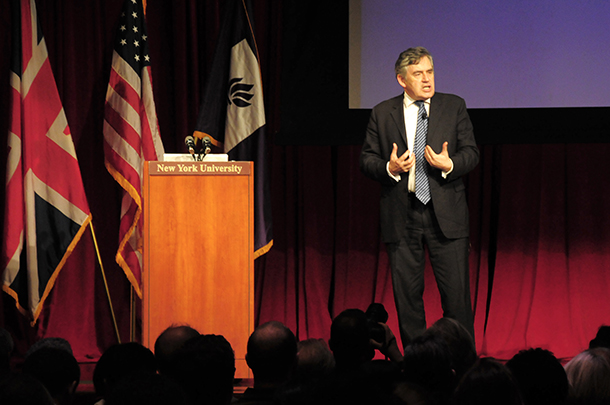
Former British Prime Minister Gordon Brown delivered an address on the global economy to an eager audience of NYU students and faculty in the Kimmel Center for University Life early Monday afternoon.
Brown’s speech, which was based on statistics, theory and social philosophy, boiled down to two trajectories. The first projected the fate of the international market within 20 years- — predictions primarily based on Brown’s anchored belief in the potential of constantly evolving education and innovation. The second delved into the roadblock Brown believes is most critically inhibiting economic growth: a lack of global collaboration.
“It’s wrong to see ourselves as threatened by the rise of a new middle class in Asia,” Brown said.
Brown commenced his speech by highlighting gaps in the drastic shift the global economy has seen in consumer spending.
“Why can’t producers and consumers reach an understanding?” Gordon said. “Ten years ago, the American consumer could drive the economy forward … now, it’s a lack of confidence in the ability to sell products to the European market.”
In a quick history lesson about trends in American dependency, Gordon said 18th- and 19th-century decision-making was a relatively precise mirror of modern day economic woes. Then, states could not solve problems without national legislation, which forced them to embrace a federal offshoot. Gordon equated that collaboration to a similar necessity in 21st-century economics: nations operating in a vacuum will only continue hitting brick walls.
“You just need the global help,” he said. “We should be growing quickly right out of a recession,” Gordon said. “What was a four to five percent growth has now become two to three percent.”
He attributed the ceiling to a lack of cooperation on the global level. Then he went onto localize the issue by linking mass unemployment and general financial crises to what he considers an integral flaw in the political system.
“Politicians always parochialize their problems,” Gordon said.
His faith in international partnership drew curiosity and skepticism from the crowd, to which he acknowledged that even though no political leader runs to the electorate with financial solutions rooted in global dependency, it is nevertheless the next elemental step in progress.
Jayasree Nambisan, a Stern sophomore who attended the event, said the solutions and options he suggested were a bit theoretical and vague for her taste.
“How do we get ‘global cooperation’ to happen? Let’s be honest, most governments and people in power are greedy and want to boost their own economy, so what would make them willing to help out other countries?” Nambisan said. “Especially considering that the increasing wealth stratification is beneficial for the wealthy.”
“Another point is that he mentioned that innovating countries can stay on top, but why can’t we equalize and stabilize the global financial industry by compensating manufacturing-heavy countries more?” she said.
After a brief examination of the post-Revolution future of Middle Eastern markets and the urgency to move away from public sector education in countries that yield unemployment like Egypt, the former Prime Minister ended his address with a call for belief.
Brown said the state of world economics could and will forge a successful path as long as its citizens invest belief in JFK’s Declaration of Interdependence and espouse increased global collaboration.
A version of this article appeared in the Tuesday, Sept. 25 print edition. Siddhi Sundar is a contributing writer. Email her at [email protected].





















































































































































